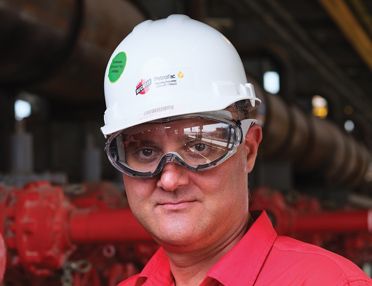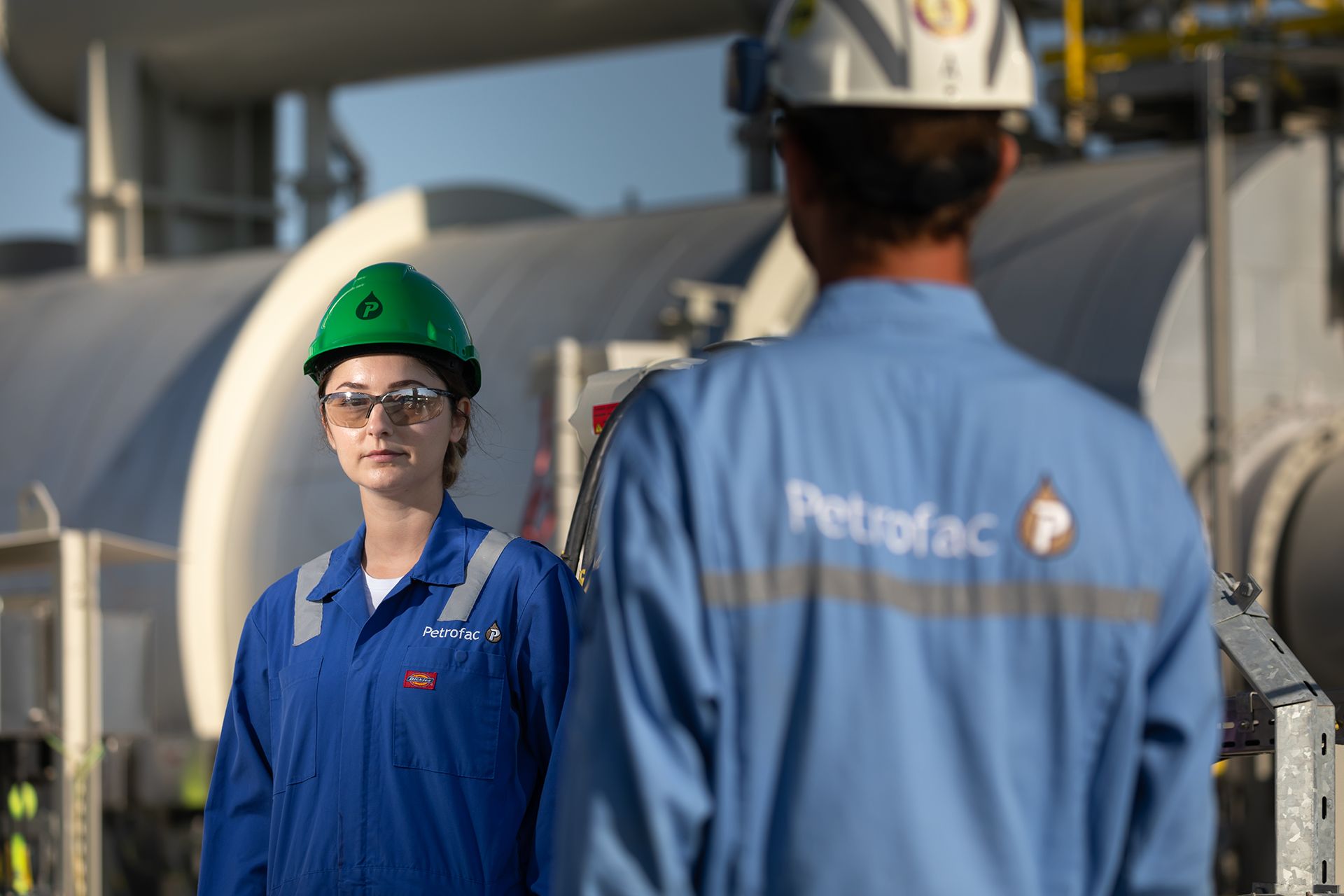TAKE TWO
PEOPLE
Two award-winning engineers. One rising star and one stalwart of Petrofac. Petrofacts speaks to John Beshara and Lakshmi Venkatesh about their journeys so far, what advice they would give to their peers, and their love for engineering
WORDS CHRISTINA McPHERSON
PUBLISHED APRIL 2020

The world was in near lockdown amid the Covid-19 pandemic when Petrofacts caught up with two of the company’s engineers.
John Beshara was safely tucked away on an artificial island 80km off the coast of Abu Dhabi, where he is Electrical Commissioning Lead for a major offshore field development project in the UAE.
Lakshmi Venkatesh, meanwhile, is managing a team of 850 engineers from her home in India. She is General Manager of the Mumbai office, which focuses on the design and engineering of oil and gas upstream facilities.
She says she has overcome many challenging situations in her career, but none quite as tough as working during a pandemic.
“Mumbai was a back office when I moved from Sharjah in 2006 to set up the process department,” she recalls. “We went on to win and execute the FEED for the El Merk project with very few people in the office. But nothing has been as challenging as today – I just never imagined this could happen.”
Looking back to where it all began
It was clear that John and Lakshmi were suited to careers in engineering from a young age. John says he was inquisitive as a child and “always wanted to understand how things worked”. His first taste of Petrofac came while he was studying Electrical Engineering at the American University of Beirut in Lebanon. He completed an internship in 2011, before joining the company a year later following his graduation. “I was in the first building for Petrofac in Sharjah – block A,” he remembers.
John has since worked on a number of projects, including the Galkynysh Gas Field Development project in Turkmenistan, the Badra Oil Field project in Iraq, and the Bab Habshan Oil and Gas and Bab Gas Compression projects in Abu Dhabi.
Lakshmi was inspired by her father to pursue her dreams. “He would always be working on his car – it was his favourite pastime,” she says. “I was the eldest daughter, so I was the one running to the house, getting him a spanner. I was a doer. My father told my sister and I there was nothing we couldn’t do.”
It was rare for women to study chemical engineering in the 80s in India and Lakshmi was one of only three women in a class of 60, but she says she was never discouraged, and the sector has now opened up. Her first job was at Larsen & Toubro, before moving to Davy Powergas (now Aker Solutions). She joined Petrofac in 2004 as a lead process engineer and was soon promoted to head of the process group in Mumbai, where she grew the department to more than 90 people. Eight years later, she became general manager of Petrofac’s Delhi office and in 2016 she returned to Mumbai.
What’s evident when John and Lakshmi talk about their careers so far is their passion for engineering. “It’s a challenging discipline and you need to use your knowledge to ensure what you’re designing is fit for purpose. That’s the exciting part,” says John.

2012
John graduating from the American University of Beirut in Lebanon. John says it was challenging transitioning from university to the workplace. “At university everything is theoretical, whereas in the workplace everything is practical,” he adds. “So, you have to adapt to understand the nature of work, to be able to perform, to analyse issues.”
1982
Lakshmi after winning a debating competition for her university. Lakshmi studied at the University of Mumbai, Department of Chemical Technology (now the Institute of Chemical Technology (ICT)). “I was really good at chemistry and mathematics, so at that time chemical engineering seemed a good choice and I breezed through the admission at UDCT,” she remembers.


2013
Lakshmi in Algeria on the El Merk project site. Asked about what she loves most about engineering, Lakshmi says: “Engineering gives you structure, but it doesn’t confine you and provides leeway in different ways to achieve the end product. And that makes it interesting because each project will bring its own challenges.”
Winning in more ways than one
As well as their love of engineering, Lakshmi and John have something else in common – they were both recently recognised by their peers. John was named ‘Rising Star’ at last year’s Petrofac’s EVE Awards, while Lakshmi was awarded ‘Woman Executive of the Year’ at the Federation of Indian Petroleum Industry.
The awards took them by surprise. “All the other participants had come with their own camera crews,” laughs Lakshmi. “I was the only one who hadn’t. The person sitting next to me started coughing in the middle of the ceremony, I gave him a sweet, and he offered to photograph me! I really felt a sense of fulfilment.”
There’s no doubt winning awards makes them feel proud, but they get more satisfaction from their work. “I feel proud when I receive exceptional satisfaction from my respective managers and directors I had throughout my career, which shows and proves their trust in my work,” says John.
“It’s nice when you walk into a conference or exhibition, and someone says you are a role model to me. That makes me proud,” adds Lakshmi.
Learning from each other
While John is in the infancy of his career, Lakshmi has amassed years of experience. So, what advice would she give to her younger self?
“I was a very impatient person and would get upset if things didn’t go my way. So, stick to your goals but understand that you might have to make some adjustments,” she says. “I feel I was too harsh on myself sometimes.”
Yet, Lakshmi believes there is still much she can learn, particularly about technology from her team. “I never tell people how I want things done, I just tell them what I want done, and they will come up with new and different ways of doing it,” she says.
And what advice would John give to those starting out in their careers? “It is very important to be technically sound, but non-technical skills are just as important for an engineer to be able to move up the ranks, whether this is negotiating, strategy, people skills.”

2016
John onsite at the Bab Gas Compression project in Abu Dhabi. John says he’s had exposure to the many diverse areas of engineering – design, commissioning, construction and project delivery – in his career so far.
Lakshmi and John in three
What are three words that describe you?
John: Though I don’t like to talk about myself, I would say the following: organised, proactive, professional.
Lakshmi: I was struggling with this, so I looked at my 360 feedback to see what others said about me. Strong, decisive, unbiased.
What makes a great engineer?
Lakshmi: The ability to think on your feet. Engineering skills can be taught but I want to know if someone can analyse a problem and walk me through their thought process. This is important going forward, as the problems we will have in the future are not the same as the past.
John: Engineers know how to effectively solve problems, while having the capacity to manage their team at the same time.
Who is your engineering hero?
Lakshmi: Dr A.P.J Abdul Kalam, he was the 11th president of India with a background in aerospace engineering. He was known as the ‘Missile Man of India’ as he played a crucial role in the development of India’s missile and nuclear weapons programme. He was an extremely humble person – to go from having no social standing to becoming the president of the largest democracy in the world is really phenomenal. He shows you can rise from nothing.
John: Prof. Hazem Chahine who taught me during my university studies about electrical power systems. He is very strict but down-to-earth and a humble person. Prof Chahine established the electrical network grid in Lebanon and because of him I had my interest in power and energy sparked.
Lakshmi and John in three

2019
John won the EVE Rising Star Award in 2019, so what did winning the award mean to him? “The award gave me more confidence that my work and efforts were recognised and noticed by corporate and senior management,” he says.
What are three words that describe you?
John: Though I don’t like to talk about myself, I would say the following: organised, proactive, professional.
Lakshmi: I was struggling with this, so I looked at my 360 feedback to see what others said about me. Strong, decisive, unbiased.
What makes a great engineer?
Lakshmi: The ability to think on your feet. Engineering skills can be taught but I want to know if someone can analyse a problem and walk me through their thought process. This is important going forward, as the problems we will have in the future are not the same as the past.
John: Engineers know how to effectively solve problems, while having the capacity to manage their team at the same time.
Who is your engineering hero?
Lakshmi: Dr A.P.J Abdul Kalam, he was the 11th president of India with a background in aerospace engineering. He was known as the ‘Missile Man of India’ as he played a crucial role in the development of India’s missile and nuclear weapons programme. He was an extremely humble person – to go from having no social standing to becoming the president of the largest democracy in the world is really phenomenal. He shows you can rise from nothing.
John: Prof. Hazem Chahine who taught me during my university studies about electrical power systems. He is very strict but down-to-earth and a humble person. Prof Chahine established the electrical network grid in Lebanon and because of him I had my interest in power and energy sparked.
1993
Lakshmi in Brussels while she was working for Davy. Here, the team did the Factory Acceptance Test for a DCS for an oxo-alcohol project. “It was very interesting as originally, because of the project location and given some cultural sensitivities, they did not want women in the team,” says Lakshmi. “Later, they relented as long as I did not attend any meetings with the owner group.”


